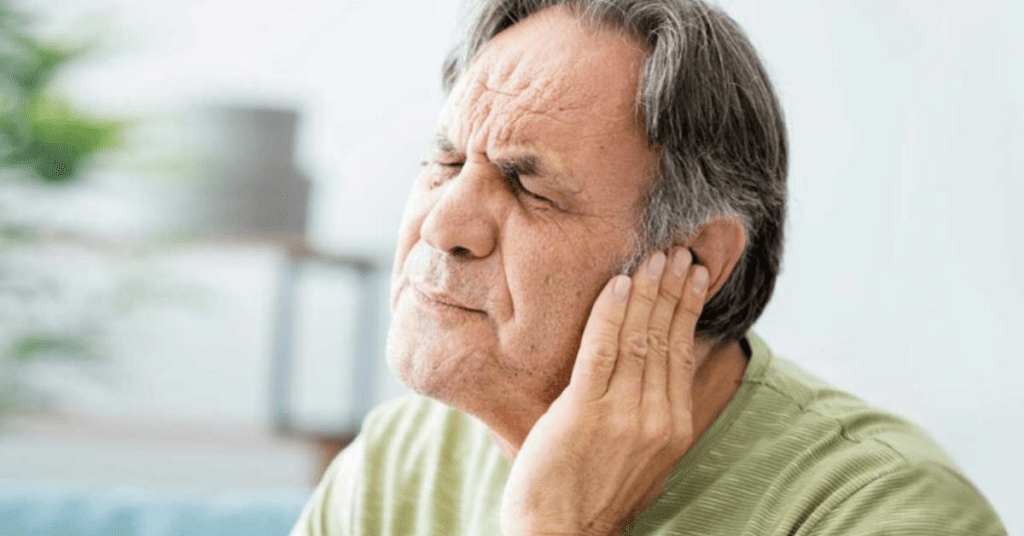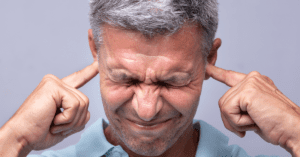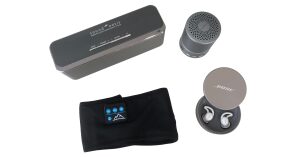If changing weather sets off bells in your ears, you’re not alone. There’s a wealth of evidence that temperature changes can cause a spike in tinnitus. This raises two questions: Why does longer-term, seasonal change in weather wreak so much havoc on our ears? And why do we feel just as much discomfort with even short-term fluctuations in air pressure?
Changes In Barometric Pressure And Our Ears
Stress on the eardrums is common whenever there are fluctuations in air pressure – like airplane travel, hiking at high altitudes, or scuba diving. The eustachian tube connects the middle ear to the back of the throat – its job is to regulate the pressure in the middle ear. In cases where there is a sudden change in pressure and the eustachian tube within the ear is unable to regulate the pressure properly, it is possible to experience a “barotrauma.”
"Treble Health helped me reduce my tinnitus by about 80%, and now I can live my life again!"


"Treble Health helped me reduce my tinnitus by about 80%, and now I can live my life again!"
– Steve D.
Book a free consultation to learn which Treble Health solution is right for you. Join Steve and thousands more who have found lasting tinnitus relief.
Most commonly, barotrauma can manifest as minor ear pain or a sensation that you need your ears to “pop.” Some people describe it as a sensation that their ears are clogged, discomfort in the ears or describe a slight hearing loss. These sensations are typically temporary, mild, and should correct themselves as pressure normalizes. In more rare cases, authors of a 2021 study describe that these pressure changes that can cause barotrauma may in fact exacerbate tinnitus due to changes in the cochlear fluids.
The Seasonal Toll On Tinnitus
In other cases, spikes in tinnitus can occur from brief temperature changes. When it comes to increased intensity or frequency of tinnitus that may accompany weather events, barometric pressure is often to blame. Because changes in barometric pressure typically coincide with changing weather, it’s no surprise our ears would be affected.
Not all changes in weather are as short-lived as a brief cold front or coming thunderstorm (when barometric pressure is especially hard on your eardrums). Weather-related tinnitus also comes from longer-term weather changes, like the transition from fall to winter. These more sustained transitions are problematic not only due to a spike in barometric pressure, but also because of higher occurrences of infections like colds and the flu, which make us more susceptible to ear infections and tinnitus flare-ups.
From Biology To Behavior
While many of these weather-related external factors are outside our control, temp-triggered tinnitus can actually be more behavioral than biological.
It’s well-established that our habits play an outsized role in tinnitus. People are more likely to be sedentary in winter, for example, which can worsen tinnitus. With a later sunrise and earlier sunset, we’re also more apt to grab an extra cup of coffee in the morning or add a second glass of alcohol at night – both common tinnitus triggers. Add to that increased rates of seasonal anxiety, depression, and reduction in exposure to natural sunlight – all common during winter and key factors in tinnitus – and it’s no wonder we experience more ringing in our ears. And because stress often begets stress, the additional health frustrations weaken our immune system and compound our susceptibility to anxiety and depression, exacerbating the ringing. This is true whether we’re trying to tame acute bouts of tinnitus brought on by rapid weather changes or the more chronic cases of tinnitus from changing seasons.
Quieting The Hum
If you’re experiencing more frequent or disruptive ringing than normal, there are a few things you can try.
First, relax. Calming the physical body has real and immediate benefits on stress levels and overall health. From yoga and deep breathing to sound therapy and meditation, relaxation can be a highly effective treatment for tinnitus and a host of other conditions made worse by heightened tension.
Second, pay attention to activities and behaviors that precede a tinnitus flare-up. Did you have more or less sleep than usual, more caffeine or alcohol, or miss a morning workout? Be mindful of dietary changes, too, like excess sodium, which is both a favorite additive in cold weather soups or those salty chips you might grab when trying to “stress eat” the ring away. Salt is directly linked to increased tinnitus because it restricts blood vessels, increases blood pressure, and reduces blood flow to the cochlea.
Third, warm up. In a 2017 study, warmer temperatures were correlated with lower levels of tinnitus and improved hearing. While we can’t always skip town during a cold snap to soak up the joy of rest and warm weather (though do it if you can!), avoiding unnecessary exposure to cooler, unpleasant climates may help improve symptoms.
And lastly, chat with your doctor or a mental health provider about cognitive-behavioral therapy (CBT) as a tool to manage tinnitus and other health challenges. This is especially helpful for those short-term, “barotraumatic” bouts of ringing. While not a cure, CBT helps take much of the stress and frustration out of the experience by teaching skills to co-exist with discomfort in a way that eases the pain.
Next Step: Book Free Consultation
- 75% of patients reduced their tinnitus within three months after following our recommendations.
- "I feel like Treble Health literally gave me my life back." - Randy S. (verified customer)
- Join thousands of people who have reduced their tinnitus after scheduling a free consultation.


















